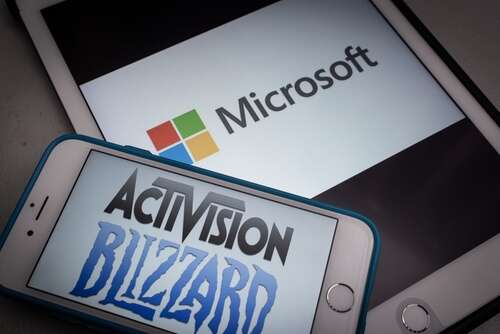
Executives from Microsoft and Activision Blizzard have blasted the UK’s Competition and Markets Authority’s (CMA) decision to block the planned $69bn (£55bn) acquisition of the games developer by MSFT, saying the decision stifles investment, competition and job creation in the UK. It comes at a time when the UK government is pushing for the country’s credentials as a global tech hub, with ambitions to be a ‘global tech superpower’ by 2030.

Speaking on the Today Programme on BBC Radio Four this morning following the CMA’s decision, the president of Microsoft, Brad Smith, said that the UK is becoming less attractive following its departure from the European Union: “For all of us who had some hope that the UK, post-Brexit, would construct a structure that would even be more flexible, that would be better for investment, better for technology, we’re now finding that the opposite appears to be true,” Smith said.
He continued that for people who wanted to found a company, the UK isn’t an attractive place due to regulators stopping them from selling to other companies: “There is a clear message here. The EU is a more attractive place to start a business if you want someday to sell it than the UK,” he argued.
“The English Channel has never seemed wider in terms of Europe as a continent being attractive for investment, Brussels as a place where one can sit down and actually have a conversation with the regulators who are accountable to the elected leaders, and the difference we now confront in London, where we have regulators who are not only unelected but unaccountable and now making decisions that just feel fundamentally unwise.”
Microsoft announced the blockbuster deal for the games studio, which makes triple-A titles including the Call of Duty franchise, last year, but it has since become mired in regulatory hold-ups.
Upholding competition in cloud gaming is key, CMA says
The CMA announced its decision yesterday, stating that it felt the Microsoft-Activision Blizzard deal would make the tech giant “even stronger” in cloud gaming and would “stifle competition” in what the regulator considers to be a growing market. Its final decision said that Microsoft’s proposed remedies failed to effectively address concerns raised by the CMA about the deal.
According to the CMA, monthly active cloud gaming users in the UK more than tripled from the start of 2021 to the end of 2022. The sector is forecast to be worth up to £11bn globally and £1bn in the UK by 2026.
“Cloud gaming is growing fast with the potential to change gaming by altering the way games are played, freeing people from the need to rely on expensive consoles and gaming PCs and giving them more choice over how and where they play games,” said Martin Coleman, chair of the investigating panel. “This means that it is vital that we protect competition in this emerging and exciting market.
“Cloud gaming needs a free, competitive market to drive innovation and choice. That is best achieved by allowing the current competitive dynamics in cloud gaming to continue to do their job.”
Claims UK’s attractiveness as a tech destination in jeopardy following Activision Blizzard decision
In an open letter to its employees, Activision Blizzard CEO Bobby Kotick said that the company will contest CMA’s decision alongside Microsoft, saying that the deal is “good for competition.”
He took the opportunity to criticise CMA’s decision and the validity of the UK as a place to invest: “The UK hopes to grow its leadership position in technology, and a combined Microsoft-Activision would accomplish exactly that.
“At a time when the fields of machine learning and artificial intelligence are thriving, we know the UK market would benefit from Microsoft’s bench strength in both domains, as well as our ability to put those technologies to use immediately,” he wrote. “By contrast, if the CMA’s decision holds, it would stifle investment, competition, and job creation throughout the UK gaming industry.”
Claire Trachet, CEO and founder of business advisory, Trachet, agrees that CMA’s block could impact future mergers and acquisitions in the UK: “The verdict acts as a critical moment on the global M&A stage, as the deal has a direct impact on the attractiveness of the UK as an M&A destination – considering the adverse consequences of not carrying out a takeover offer,” Trachet said.
“While the Microsoft-Activision merger is the biggest all-cash deal in tech history, the blow dealt by the CMA may mean that other companies looking to venture out in such a way may refrain from doing so.”
The takeover is facing scrutiny in other territories too, with the EU competition regulator is due to give a decision on the merger by 22 May, and a US FTC evidentiary hearing about the deal scheduled for 2 August.






